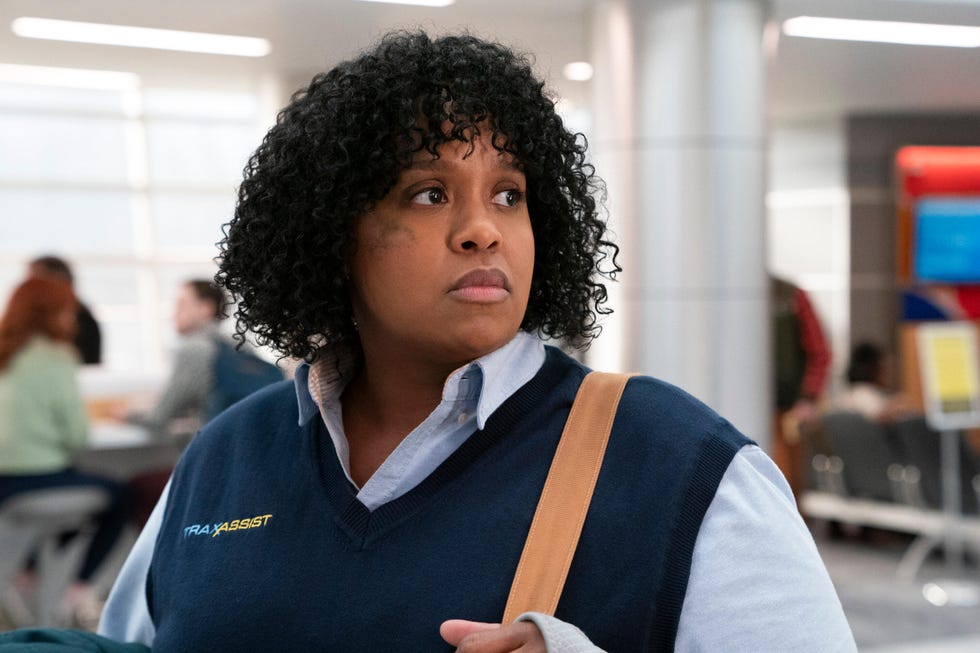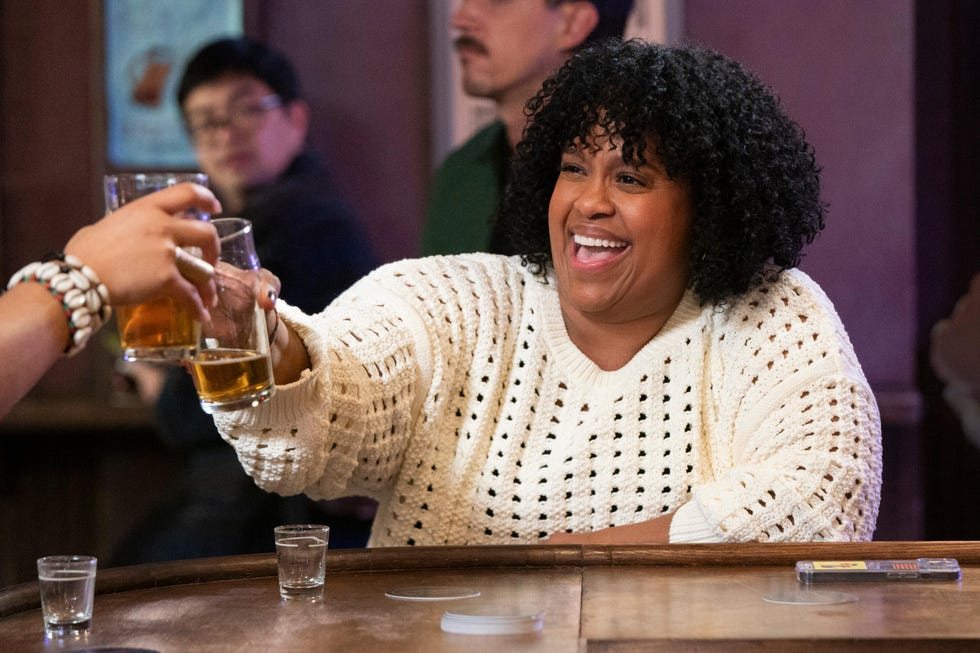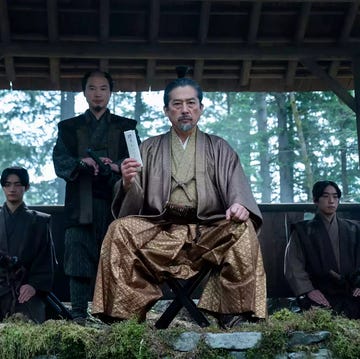Natasha Rothwell is getting used to being the center of attention in this era of her life—and it’s been a long time coming.
The actor and screenwriter has been making us laugh consistently since her breakout role as Kelli on HBO’s acclaimed comedy Insecure. From that came a steady stream of scene-stealing appearances in shows and films, including Wonder Woman 1984, Wonka, and an Emmy-nominated performance in The White Lotus. Each individual project has spoken to Rothwell’s affinity for authentic stories, but her latest, the hilarious Hulu series How to Die Alone, specifically feels tailor-made for the actor. (It helps that along with starring on the show, she is the head creator.)
How to Die Alone features the actor as neurotic, perpetually down-on-her-luck airport employee Mel, and the comedy is the type of if-you-know-you-know humor that captures viewers in the most unexpected ways. Rothwell describes the show as a whole as “a radical call to action for folks to combat loneliness with connection and vulnerability.” The alarmingly realistic romantic woes, the relatable friendship quips, and the easily digestible jokes that Rothwell and her writer’s room have come up with are all tools that give How to Die Alone its own special brand of humor. The series, whose first four episodes premiered last week, feels like an exciting, pivotal new chapter for her.
When asked how she’s feeling as she grapples with the swift pace of her life now, Rothwell says that everything she did before has prepped her for it—including a stint in the Saturday Night Live writers’ room, as well as spending years as a teacher in the Bronx. It’s those experiences, taken from real life and turned into brilliantly curated comedy, that have kept audiences rooting for Rothwell all these years.
Rothwell has also always been a storyteller. She tells Harper’s Bazaar it has been the joy of her career to help others tell their stories–so shifting to spearheading the telling of her own is a natural next step. “I don't typically walk through life with main character energy, so it’s been a little awkward trying to get used to the spotlight in that sense. But I’m really happy to be here,” she says.
Below, we catch up with Rothwell to discuss How to Die Alone, what it’s like creatively stepping out on her own, and the personal calling she feels to create nuanced television for Black women.
How are you feeling in this moment, as you’re getting ready to share How to Die Alone with the world?
It’s really exciting to be in this moment right now in my career, and I feel so grateful for the work that I’ve done before now. I feel like it’s all been preparing me for this, but even with that kind of lived experience as preparation, nothing prepares you for being center frame and going on a press tour and promoting your show and having another show coming out following that. It has been really beautiful and amazing to see people show up for me and support me.
Can you tell me how previous roles prepared you for becoming a main character on your own show?
I think for me it’s kind of a culmination of all of my experience. I’ve been performing since I was super young and have always been a storyteller, and it’s been the joy of my career to help others tell their stories. And so shifting it to telling my own, I think, was sort of the natural next step. Insecure was an amazing training ground—being able to be front row and center for Issa Rae’s journey, and her being the star and creator of the show. I was definitely taking notes over the years.
On The White Lotus, your character, Belinda, was extremely multilayered. Was that role challenging, and are you excited to be continuing her story in the upcoming third season?
I loved my experience on White Lotus season one. I am obsessed with Mike White and have been a huge fan of his, and I feel fortunate that I can call him a friend now. And for me, the role of Belinda excited me to no end, because it was an opportunity to play against type. I think I’m so grateful for the opportunity because it alerted the industry at large that I can do more than just one thing, and I can do things that are layered and nuanced, and I can also craft a very biting dick joke for Insecure. I can do a lot.
It was really wonderful and a breath of fresh air. I’m so thrilled with season three. I spent five months in Thailand working on the show, and the audiences aren’t ready. I mean, they just aren’t ready for what’s about to come. It is bigger, and more crazy and insane than any other season. And I say it as a fan of the show—I think it’s the best one yet.
Does it feel full circle to have been part of an ensemble cast on Insecure and now to have one of your own?
It’s giving full circle. It’s incredible. I think for me, I love collaborating. I love surrounding myself with amazing, talented people, because I believe iron sharpens iron. And so, being able to populate the cast and the crew with incredible talent was an amazing catharsis of being able to do for me what I have done for others on their shows. And it’s just such an honor and a privilege to be able to work alongside such talented people.
How do you sustain yourself?
It might feel a little bit like a sermon, but I do feel like I’m called to do this work. I think that when you're operating in flow and purpose, there’s a really strong wind at your back and you feel this sort of universal support when you’re fighting the good fight. Walking through the world as a Black, plus-size woman, there are many a fight that I have, but I do feel held and supported by this calling, and it’s by no means easy.
I have such great friends and family that give me the support I need, and there are very hard days and there are very amazing days. But to me, what keeps me going is knowing that the work that I’m putting into the world and the work that I’m trying to do by putting other people’s work in the world through my production company [Big Hattie Productions]—all of it is just serving a greater purpose of centering marginalized voices and making people feel seen and less alone. It’s a hard journey, it’s a long journey, but I’m up for it.
Are there any legends of the past that you looked to who you feel are indicative of your prowess in the comedy space right now as a Black woman?
Whoopi [Goldberg] for sure. [Who] sticks out for me is Nell Carter. I watched Gimme a Break! when I was younger, and it was just amazing to see a plus-size woman who’s the star of a show, [who] was unapologetically herself, and [she was serving] major boss energy. She was so funny, so talented, and so it was formative in terms of seeing myself represented onscreen, and seeing someone who was so funny and smart on a network comedy was huge.
Was one point of How to Die Alone to show a multifaceted Black woman who is balancing her personal life and career growth, but still just trying to be her most authentic self in all these settings?
One thousand percent. I think so often, walking through the world as a plus-size Black woman, people have preconceived notions about what I can do and how I can behave, and I contain multitudes. And the experience of being a Black woman is as varied as there are many of us. We’re not a monolith. I think that it’s important to show all of the colors that can be painted with characters and not just limit the expression of emotion and the expression of character to just comedy or drama. Life is a beautiful blend of both, and it was important for me to have that authenticity expressed and how the character purports herself in her relationships with others, and with herself.
Do you feel that the first episode of How to Die Alone signals the creativity and the energy that you’re bringing to this era of your career?
I would start by saying pilots are notoriously difficult and even the most seasoned writer will tell you that. And so I’m proud of the pilot that we shot and made, and it definitely has a lot going on and intentionally, and I wanted it to feel as exciting and unexpected beat after beat, page after page, so that audiences really would lock in. And I do think that is also a parallel of what’s happening in my career. I want to be able to explore all of the amazing things that are happening, and sometimes life feels a little chaotic and messy and that’s okay. And I think it’s embracing it and seeing it for the beauty that it has.
Can you walk me through what is was like expressing yourself and being emotionally vulnerable onscreen throughout the series?
I think I’m grateful for the amazing cast that I worked with, and you have to really sort of create a safe environment for you to go there emotionally with your characters. I definitely felt that—and for me, this show is truly an expression of my lived experience. [It’s] dressed up in characters and plot lines that aren’t necessarily real, but the journey of coming to yourself and figuring out how be less lonely and being vulnerable and fighting to be authentic [is].
All of those struggles are lived experiences. And so [thankfully] after a lot of therapy, a lot of the lessons I learned in the past, I was able to revisit them with this show. It’s an emotional thing when you go back to the unhealed version of yourself and you can’t help but be overwhelmed with compassion for her. You can’t help but be overwhelmed by the pain and the sort of rawness of that pain when you have the opportunity to revisit those moments. It was a real privilege to be able to go there in the show, and I’m so proud of the work that I did and so grateful to have the support of those [who] surrounded me.
Is there a lesson you’re hoping that fans walk away from after watching the season in its entirety?
I hope audiences find themselves rooting for Mel and in turn root for themselves. And I think that so much about the show is about taking action, and even if it means making a mistake, it’s about taking big swings and taking risks and really living life. And I hope audiences are inspired to do that. And I think ultimately for me, the show is an effort to help people feel less alone. And I think so often we confuse loneliness and being alone. I think being alone is not the scary part. The dying alone is not the scary part. It’s the dying lonely, and the show is just a radical call to action for folks to combat loneliness with connection and vulnerability. I hope audiences are inspired to do that.
This interview has been condensed and edited for clarity.
















